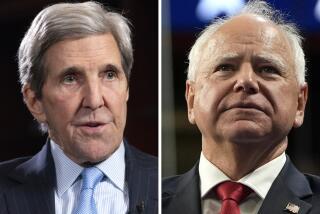Conflicting Observances of ‘Mission Accomplished’
- Share via
WASHINGTON — A year after declaring an end to major combat in Iraq under a banner that proclaimed “Mission Accomplished,” President Bush defended the conflict Saturday while two veterans pressed the Democratic case against him on the issue.
In his weekly radio address, Bush said the war had been “one of the swiftest, most successful and humane campaigns in military history,” and that “daily life is improving” in Iraq despite continuing violence.
But a veteran of the Iraq war, speaking in the Democratic radio reply, said, “Mr. President, our mission is not accomplished.”
Paul Rieckhoff, 29, called on Bush to “take responsibility for the decisions” made in Iraq and acknowledge that “something is wrong” with unfolding events there.
And Fields Black, 33, a former Marine who said he was sickened by fumes from burning oil fields during the Persian Gulf War, met with presumed Democratic presidential nominee John F. Kerry in St. Louis and scoffed at the claim Bush made last year aboard the aircraft carrier Abraham Lincoln.
“ ‘Mission accomplished’?” asked Black, wearing an oxygen tube under his nose as he sat with Kerry, a Massachusette senator, and several other veterans at the South City Diner. “More people died after that day than during the war.”
The competing radio messages and Kerry’s breakfast campaign appearance sought to influence public opinion on the Iraq situation amid mounting casualties.
A Pentagon website reported Saturday that 732 U.S. troops and two Defense Department civilian employees had died in Operation Iraqi Freedom, as of Friday morning. More than 590 of those deaths occurred after Bush pronounced the end to major combat on May 1, 2003.
In addition, the Pentagon website reported, 2,470 U.S. troops have been wounded in action and not returned to duty. More than 2,000 of those were wounded within the last year.
In his speech, Bush acknowledged the human cost.
“In the cause of a free and stable Iraq, our servicemen and women are working hard and sacrificing greatly,” Bush said. “And families of the brave troops who have fallen must know that their loss is not in vain. We will finish our work in Iraq, because the stakes for our country and the world are high.”
The president said civilian life had improved in Iraq since the fall of its dictator, Saddam Hussein. He cited wider access to electric power, a stable currency, renovated schools and rebuilt hospitals as evidence of the beginnings of a better life.
“We will not be intimidated or diverted,” he said. In reference to the scheduled transfer of civilian authority to an interim Iraqi government on June 30, he added: “On July 1 and beyond, our reconstruction and military commitment will continue.”
Bush made no reference to what was a key justification for the war: his claim that Hussein was amassing weapons of mass destruction. Instead, he praised U.S.-led coalition forces for ousting “a brutal dictator who had twice invaded neighboring countries, who had used weapons of mass destruction against his own people and who had supported and financed terrorism.”
Rieckhoff, an Army National Guard lieutenant who served 10 months in Iraq, spoke in a time slot ordinarily reserved for Democratic governors, senators and House members.
He charged that U.S. troops had not been given adequate logistical support during the invasion and the ensuing occupation.
Among problems soldiers on the ground faced, he said, was a lack of body armor, “leaving my men to dodge bullets with Vietnam-era flak vests. We had to write home and ask for batteries to be included in our care packages. Our soldiers deserved better.”
“When we got to Baghdad, we soon found out that the people who planned this war were not ready for us,” he said. “There were not enough vehicles, not enough ammunition, not enough medical supplies, not enough water. Many days, we patrolled the streets of Baghdad in 120-degree heat with only one bottle of water per soldier.”
Rieckhoff’s broadcast remarks were circulated via e-mail by Kerry’s campaign.
On the campaign trail, Kerry has often belittled Bush for striding onto the Lincoln’s deck wearing a flight suit after he had flown to the aircraft carrier aboard a military plane. On Saturday, the Massachusetts senator made no mention of that.
But Black, the former Marine, mentioned it, saying of Bush: “And you land on the aircraft carrier, strutting your stuff. And I have a hard time walking. How dare you? That’s how I look at the president.”
Black, who has been diagnosed with emphysema, then referred to the questions that surround Bush’s home-front service in the National Guard during the Vietnam War.
“Why didn’t you land a plane in Vietnam?” he asked. “Where were you then?”
Kerry last week for the first time joined other Democrats in challenging the president to prove that he fulfilled his service obligations in the National Guard in the early 1970s. The White House has released hundreds of documents from Bush’s service in efforts to resolve the matter, but the records did not show whether he met all of his obligations during a period when he was in Alabama.
During his chat with Black and other veterans, Kerry said that Republicans trying to question his record on defense and national security look “silly” because of the questions about Bush’s National Guard service.
“I mean, the guy can’t answer where he was, when he served,” he said.
*
Anderson reported from Washington, Gold from St. Louis.
More to Read
Sign up for Essential California
The most important California stories and recommendations in your inbox every morning.
You may occasionally receive promotional content from the Los Angeles Times.










